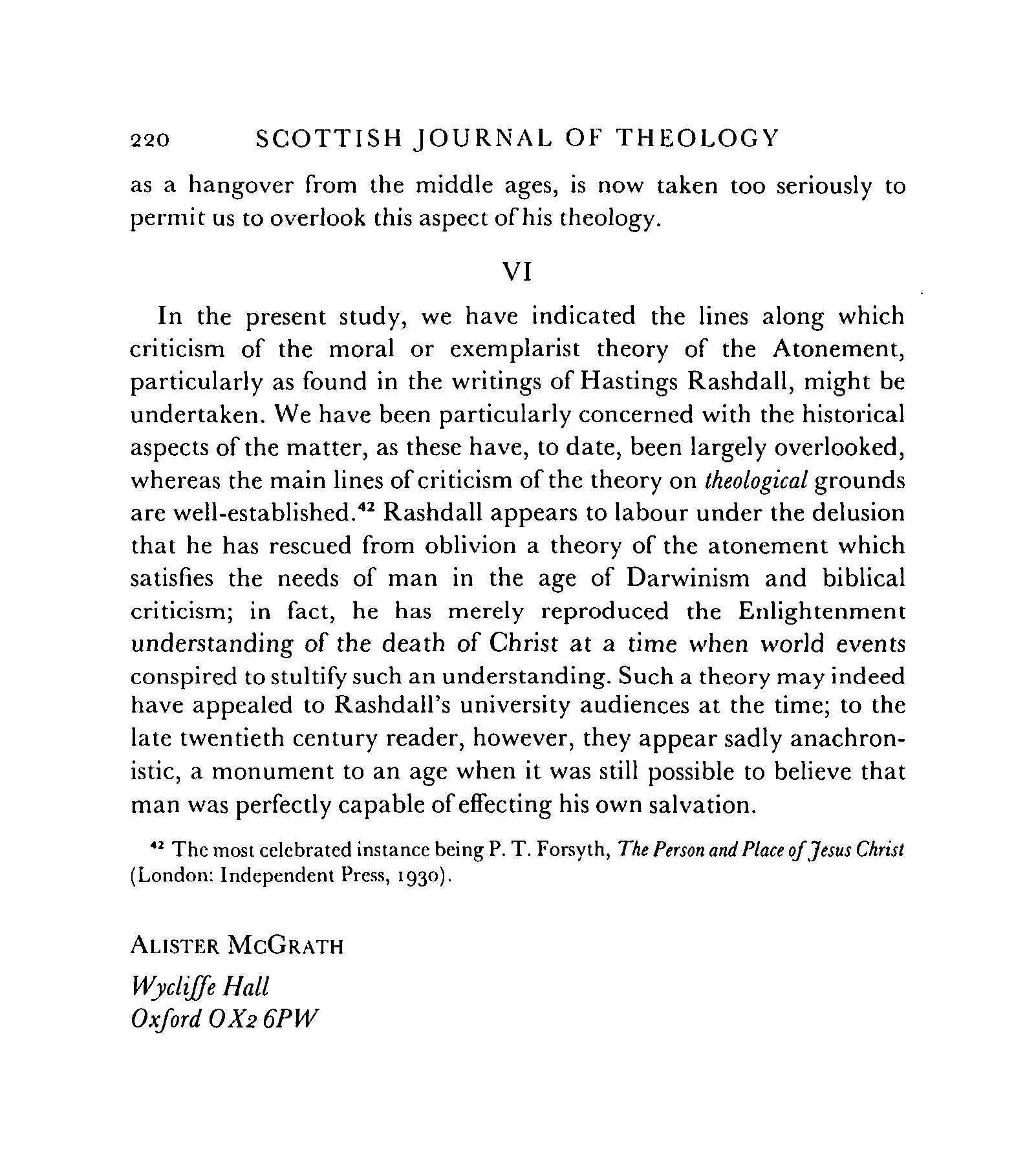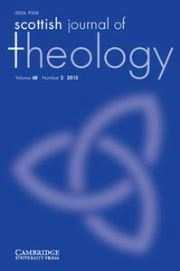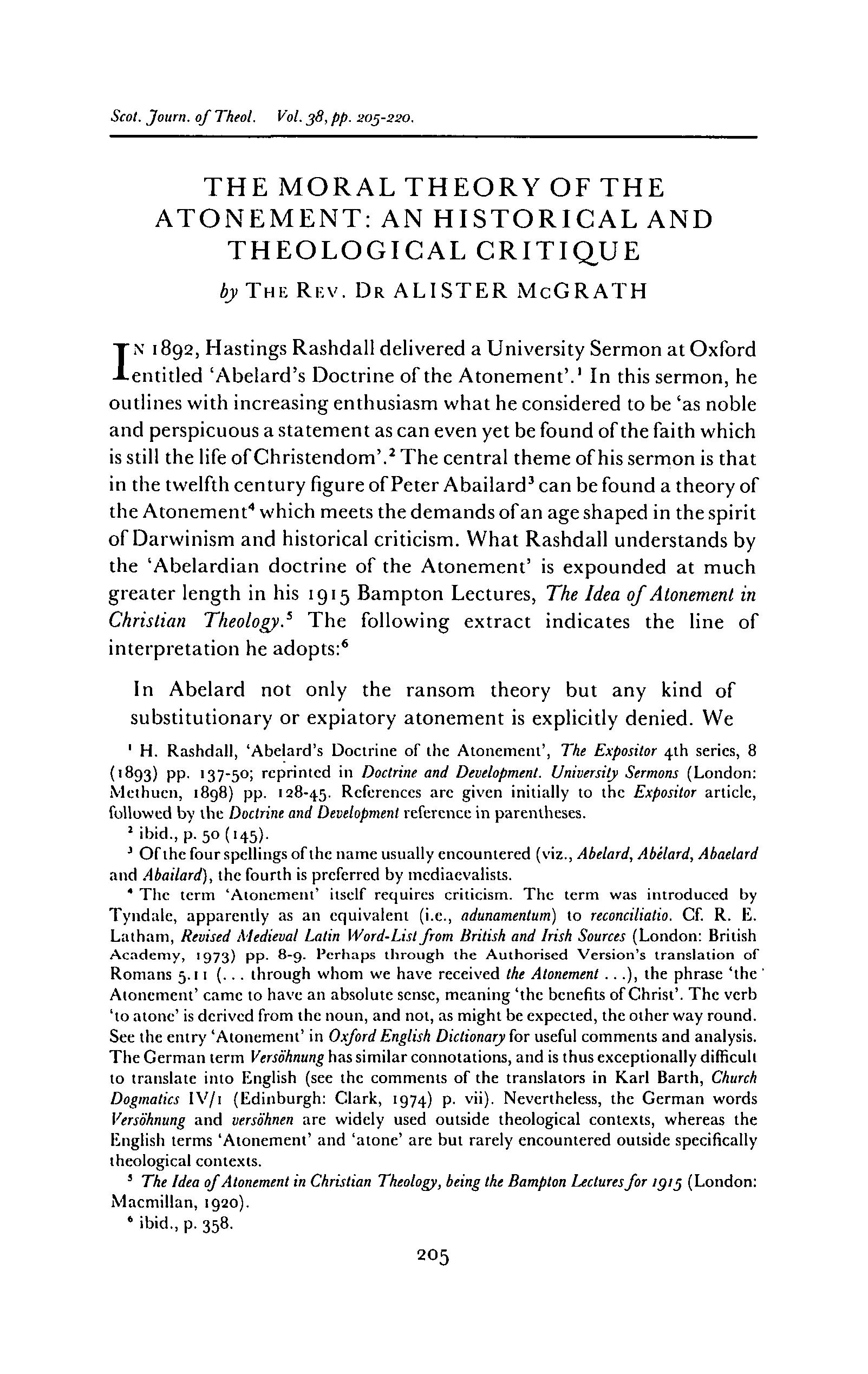THE
MORAL THEORY OF THE ATONEMENT: AN HISTORICAL AND THEOLOGICAL CRITIQUE
by THE REV D R ALISTE R MCGRAT H
IN 1892, Hastings Rashdall delivered a University Sermon at Oxford entitled 'Abelard's Doctrine of the Atonement'.1 In this sermon, he outlines with increasing enthusiasm what he considered to be 'as noble and perspicuous a statement as can even yet be found of the faith which is still the life of Christendom'.2 The central theme of his sermon is that in the twelfth century figure of Peter Abailard3 can be found a theory of the Atonement4 which meets the demands of an age shaped in the spirit of Darwinism and historical criticism. What Rashdall understands by the 'Abelardian doctrine of the Atonement' is expounded at much greater length in his 1915 Bampton Lectures, The Idea of Atonement in Christian Theology.5 The following extract indicates the line of interpretation he adopts:6
In Abelard not only the ransom theory but any kind of substitutionary or expiatory atonement is explicitly denied We
1 H Rashdall, 'Abelard's Doctrine of the Atonement', The Expositor 4th series, 8 ('^93) pp 137-50; reprinted in Doctrine and Development. University Sermons (London: lYlcthucn, 1898) pp 128-45 References are given initially to the Expositor article, followed by the Doctrine and Development reference in parentheses.
2 ibid., p 50(145)
' Of the four spellings of the name usually encountered (viz., Abelard, Abelard, Abaelard and Abailard), the fourth is preferred by mcdiacvalists
4 The term 'Atonement' itself requires criticism. The term was introduced by Tyndale, apparently as an equivalent (i.e., adunamentum) to reconcilialio. Cf R E Latham, Revised Medieval Latin Word-List from British and Irish Sources (London: British Academy, 1973) pp 8-9 Perhaps through the Authorised Version's translation of Romans 5.11 (... through whom we have received the Atonement ...), the phrase 'the ' Atonement' came to have an absolute sense, meaning 'the benefits of Christ' The verb 'to atone' is derived from the noun, and not, as might be expected, the other way round. See the entry 'Atonement' in Oxford English Dictionary for useful comments and analysis The German term Versohnung has similar connotations, and is thus exceptionally diificuli to translate into English (see the comments of the translators in Karl Barth, Church Dogmatics IV/i (Edinburgh: Clark, 1974) p vii) Nevertheless, the German words Versohnung and versohnen are widely used outside theological contexts, whereas the English terms 'Atonement' and 'atone' are but rarely encountered outside specifically theological contexts
3 The Idea of Atonement in Christian Theology, being the Bampton Lecturesfor igi^ (London: Macmillan, 1920).
* ibid., p. 358.
205
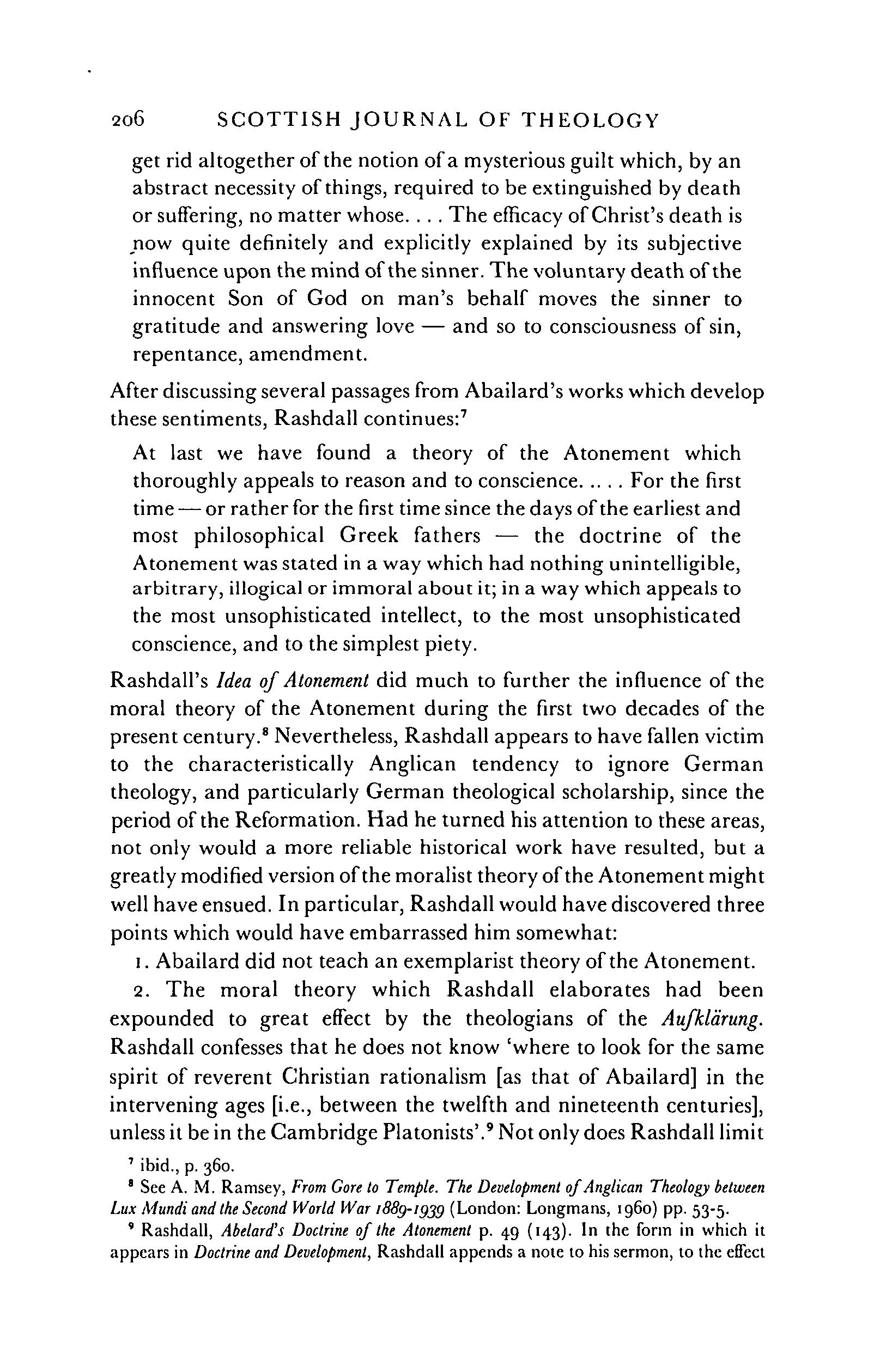
SCOTTISH JOURNAL OF THEOLOGY
get rid altogether of the notion of a mysterious guilt which, by an abstract necessity of things, required to be extinguished by death or suffering, no matter whose. . . . The efficacy of Christ's death is now quite definitely and explicitly explained by its subjective influence upon the mind of the sinner. The voluntary death of the innocent Son of God on man's behalf moves the sinner to gratitude and answering love — and so to consciousness of sin, repentance, amendment.
After discussing several passages from Abailard's works which develop these sentiments, Rashdall continues:7
At last we have found a theory of the Atonement which thoroughly appeals to reason and to conscience For the first time — or rather for the first time since the days of the earliest and most philosophical Greek fathers — the doctrine of the Atonement was stated in a way which had nothing unintelligible, arbitrary, illogical or immoral about it; in a way which appeals to the most unsophisticated intellect, to the most unsophisticated conscience, and to the simplest piety.
Rashdall's Idea of Atonement did much to further the influence of the moral theory of the Atonement during the first two decades of the present century.8 Nevertheless, Rashdall appears to have fallen victim to the characteristically Anglican tendency to ignore German theology, and particularly German theological scholarship, since the period of the Reformation. Had he turned his attention to these areas, not only would a more reliable historical work have resulted, but a greatly modified version of the moralist theory of the Atonement might well have ensued. In particular, Rashdall would have discovered three points which would have embarrassed him somewhat:
1. Abailard did not teach an exemplarist theory of the Atonement.
2 The moral theory which Rashdall elaborates had been expounded to great effect by the theologians of the Aufkldrung. Rashdall confesses that he does not know 'where to look for the same spirit of reverent Christian rationalism [as that of Abailard] in the intervening ages [i.e., between the twelfth and nineteenth centuries], unless it be in the Cambridge Platonists'.9 Not only does Rashdall limit
7 ibid., p. 360.
' See A. M. Ramsey, From Gore to Temple. The Development of Anglican Theology between Lux Mundi and the Second World War i88g-ig^g (London: Longmans, i960) pp 53-5
' Rashdall, Abelard's Doctrine of the Atonement p. 49 (143). In the form in which it appears in Doctrine and Development, Rashdall appends a note to his sermon, to the effect
206
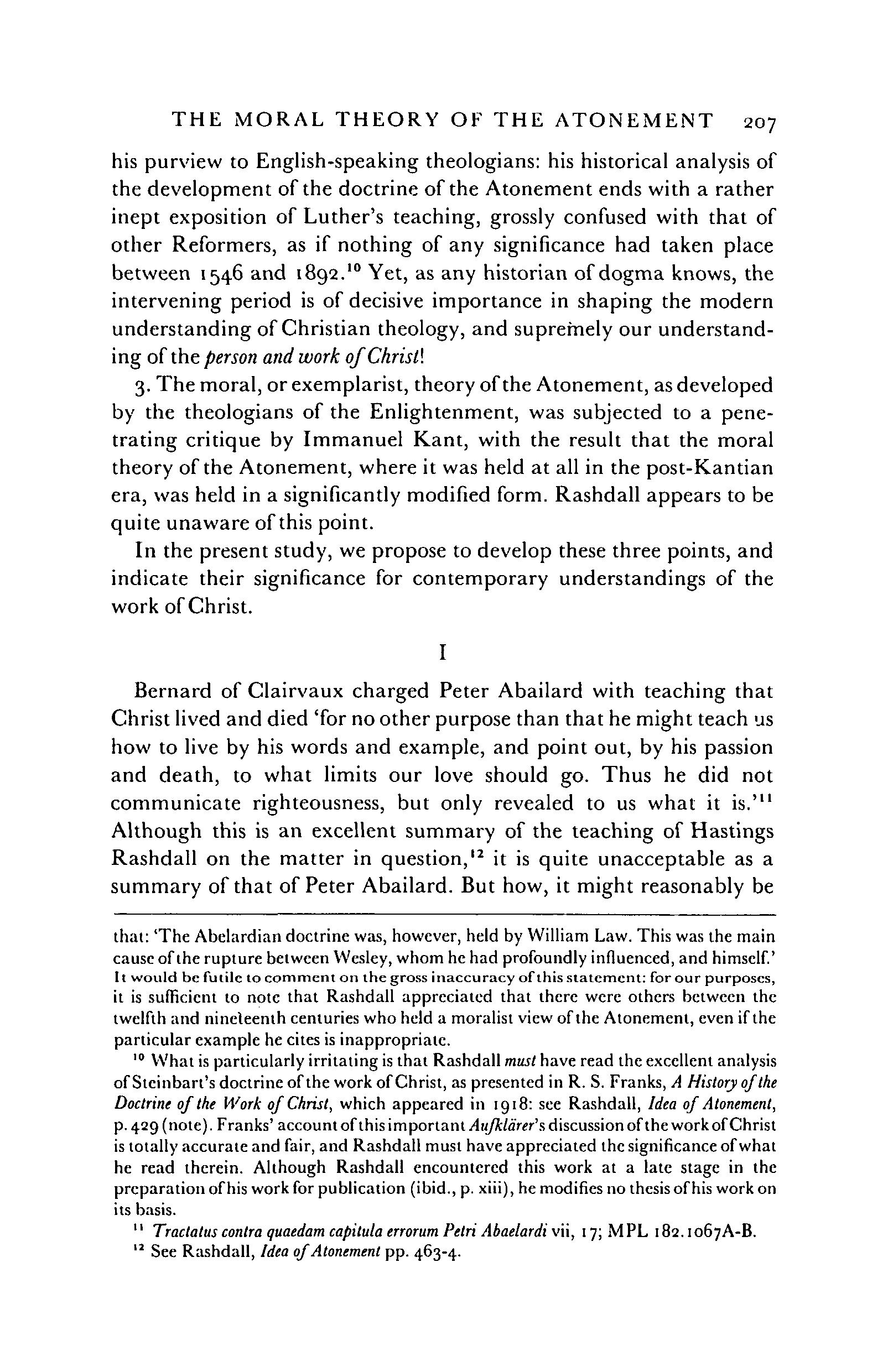
THE MORAL THEORY OF THE ATONEMENT 207
his purview to English-speaking theologians: his historical analysis of the development of the doctrine of the Atonement ends with a rather inept exposition of Luther's teaching, grossly confused with that of other Reformers, as if nothing of any significance had taken place between 1546 and 1892.10 Yet, as any historian of dogma knows, the intervening period is of decisive importance in shaping the modern understanding of Christian theology, and supremely our understanding of the person and work qfChrist\
3 The moral, or exemplarist, theory of the Atonement, as developed by the theologians of the Enlightenment, was subjected to a penetrating critique by Immanuel Kant, with the result that the moral theory of the Atonement, where it was held at all in the post-Kantian era, was held in a significantly modified form. Rashdall appears to be quite unaware of this point
In the present study, we propose to develop these three points, and indicate their significance for contemporary understandings of the work of Christ
IBernard of Clairvaux charged Peter Abailard with teaching that Christ lived and died 'for no other purpose than that he might teach us how to live by his words and example, and point out, by his passion and death, to what limits our love should go. Thus he did not communicate righteousness, but only revealed to us what it is."1 Although this is an excellent summary of the teaching of Hastings Rashdall on the matter in question,12 it is quite unacceptable as a summary of that of Peter Abailard But how, it might reasonably be
that: 'The Abelardian doctrine was, however, held by William Law. This was the main cause of the rupture between Wesley, whom he had profoundly influenced, and himself.' It would be futile to comment on the gross inaccuracy of this statement: for our purposes, it is sufficient to note that Rashdall appreciated that there were others between the twelfth and nineteenth centuries who held a moralist view of the Atonement, even if the particular example he cites is inappropriate
10 What is particularly irritating is that Rashdall must have read the excellent analysis of Stcinbart's doctrine of the work of Christ, as presented in R. S. Franks, A History ofthe Doctrine of the Work of Christ, which appeared in 1918: see Rashdall, Idea of Atonement, p. 429 (note). Franks' account of this important Aufkldrer\ discussion of the work of Christ is totally accurate and fair, and Rashdall must have appreciated the significance of what he read therein Although Rashdall encountered this work at a late stage in the preparation of his work for publication (ibid., p xiii), he modifies no thesis of his work on its basis
' ' Tractatus contra quaedam capitula errorum Petri Abaelardi vii, 17; M PL 182.1067A-B.
12 See Rashdall, Idea of Atonement pp 463-4
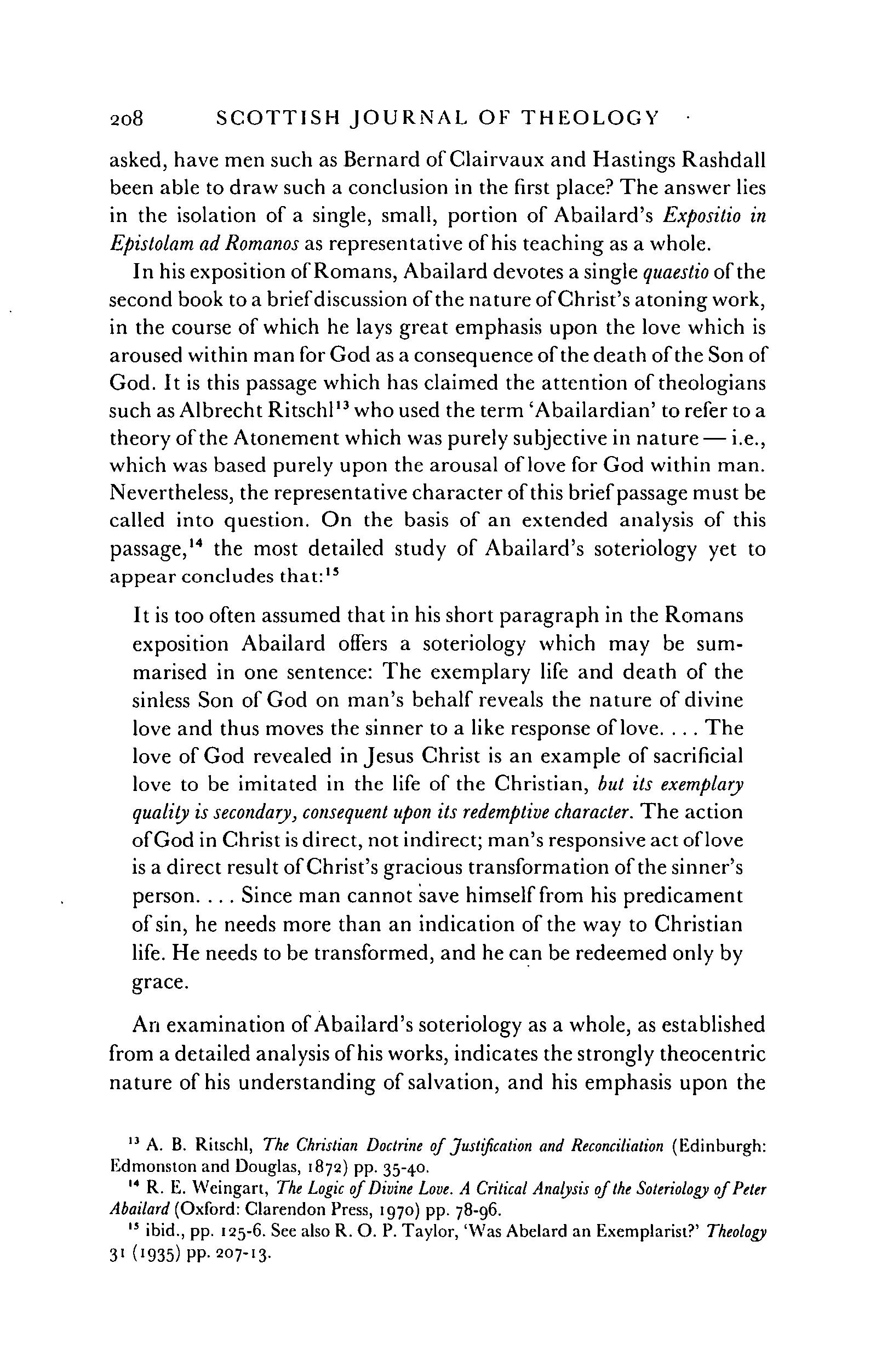
SCOTTISH JOURNAL OF THEOLOGY
asked, have men such as Bernard of Clairvaux and Hastings Rashdall been able to draw such a conclusion in the first place? The answer lies in the isolation of a single, small, portion of Abailard's Exposilio in Epistolam ad Romanos as representative of his teaching as a whole. In his exposition of Romans, Abailard devotes a single quaestio of the second book to a brief discussion of the nature of Christ's atoning work, in the course of which he lays great emphasis upon the love which is aroused within man for God as a consequence of the death of the Son of God It is this passage which has claimed the attention of theologians such as Albrecht Ritschl13 who used the term 'Abailardian' to refer to a theory of the Atonement which was purely subjective in nature — i.e., which was based purely upon the arousal of love for God within man. Nevertheless, the representative character of this brief passage must be called into question. On the basis of an extended analysis of this passage, 14 the most detailed study of Abailard's soteriology yet to appear concludes that:15
It is too often assumed that in his short paragraph in the Romans exposition Abailard offers a soteriology which may be summarised in one sentence: The exemplary life and death of the sinless Son of God on man's behalf reveals the nature of divine love and thus moves the sinner to a like response of love The love of God revealed in Jesus Christ is an example of sacrificial love to be imitated in the life of the Christian, but its exemplary quality is secondary, consequent upon its redemptive character. The action of God in Christ is direct, not indirect; man's responsive act of love is a direct result of Christ's gracious transformation of the sinner's person. ... Since man cannot save himself from his predicament of sin, he needs more than an indication of the way to Christian life. He needs to be transformed, and he can be redeemed only by grace.
An examination of Abailard's soteriology as a whole, as established from a detailed analysis of his works, indicates the strongly theocentric nature of his understanding of salvation, and his emphasis upon the
13 A B Ritschl, The Christian Doctrine of Justification and Reconciliation (Edinburgh: Edmonston and Douglas, 1872) pp 35-40
14 R E Weingart, The Logic of Divine Love. A Critical Analysis of the Soteriology of Peter Abailard (Oxford: Clarendon Press, 1970) pp 78-96
15 ibid., pp 125-6 See also R O P Taylor, 'Was Abelard an Exemplarist?' Theology 3> (1935) PP-207-13.
208
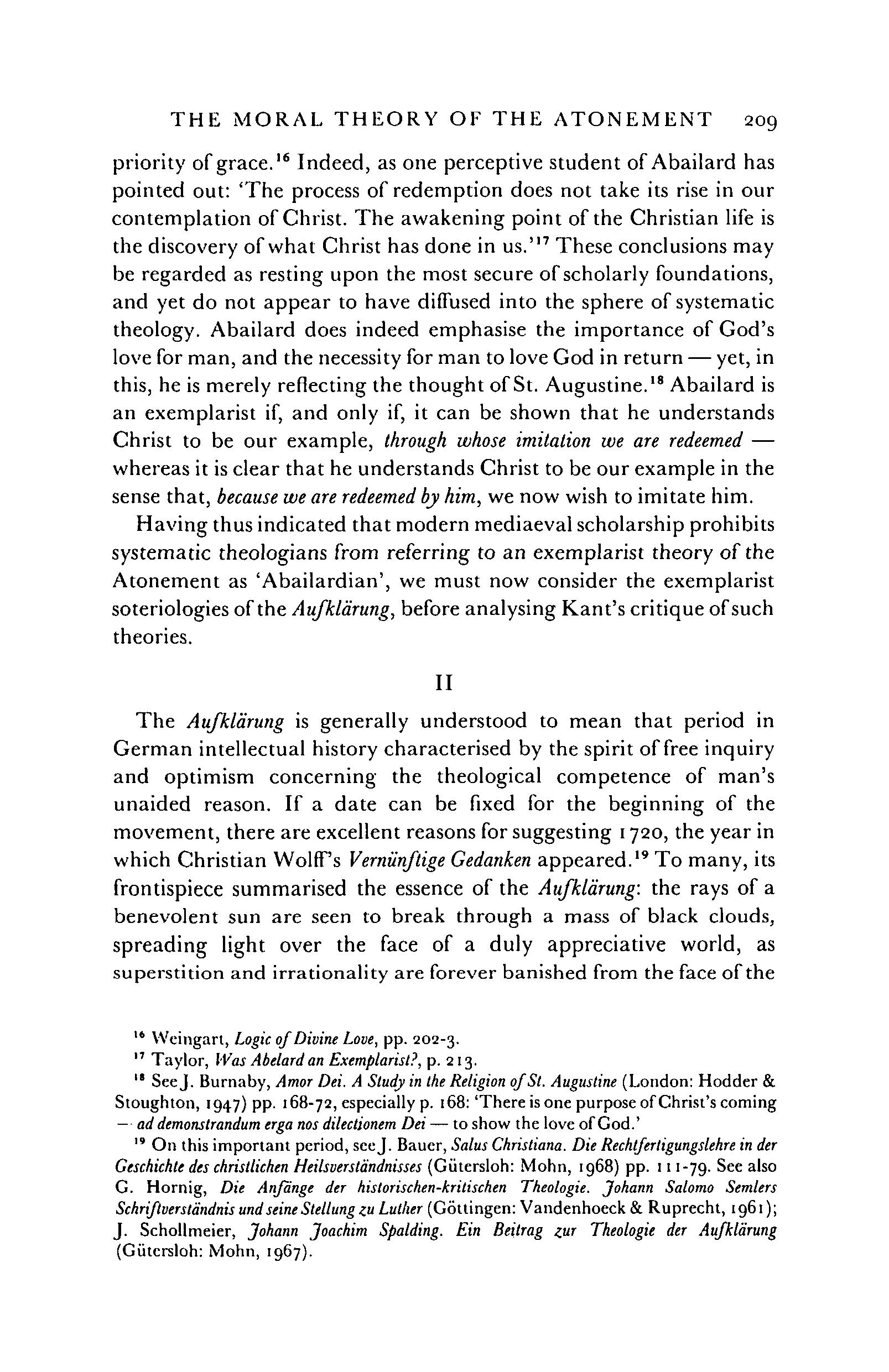
THE MORAL THEORY OF THE ATONEMENT 209
priority of grace." Indeed, as one perceptive student of Abailard has pointed out: 'The process of redemption does not take its rise in our contemplation of Christ. The awakening point of the Christian life is the discovery of what Christ has done in us."7 These conclusions may be regarded as resting upon the most secure of scholarly foundations, and yet do not appear to have diffused into the sphere of systematic theology. Abailard does indeed emphasise the importance of God's love for man, and the necessity for man to love God in return — yet, in this, he is merely reflecting the thought of St Augustine.18 Abailard is an exemplarist if, and only if, it can be shown that he understands Christ to be our example, through whose imitation we are redeemed — whereas it is clear that he understands Christ to be our example in the sense that, because we are redeemed by him, we now wish to imitate him.
Having thus indicated that modern mediaeval scholarship prohibits systematic theologians from referring to an exemplarist theory of the Atonement as 'Abailardian', we must now consider the exemplarist soteriologies of the Aufkldrung, before analysing Kant's critique of such theories
II
The Aufkldrung is generally understood to mean that period in German intellectual history characterised by the spirit of free inquiry and optimism concerning the theological competence of man's unaided reason. If a date can be fixed for the beginning of the movement, there are excellent reasons for suggesting 1720, the year in which Christian Wolff's Verniinftige Gedanken appeared.19 To many, its frontispiece summarised the essence of the Aufkldrung: the rays of a benevolent sun are seen to break through a mass of black clouds, spreading light over the face of a duly appreciative world, as superstition and irrationality are forever banished from the face of the
16 Weingart, Logic of Divine Love, pp 202-3
" Taylor, Was Abelardan Exemplarist?, p 213
" See J. Burnaby, Amor Dei. A Study in the Religion ofSt. Augustine (London: Hodder & Stoughton, 1947) pp- 168-72, especially p. 168: 'There is one purpose of Christ's coming ad demonstrandum erga nos dilectionem Dei — to show the love of God.'
" On this important period, scej Bauer, Salus Christiana. Die Rechtfertigungslehre in der Geschichtc des christlkhen Heilsverstandnisses (Gutersloh: Mohn, 1968) pp 111-79 See also G Hornig, Die Anfange der historischen-kritischen Theologie. Johann Salomo Semlers Schriftverstandnis undseine Stellung zu Luther (Gottingen: Vandenhoeck & Ruprecht, 1961); J. Schollmeier, Johann Joachim Spalding. Ein Beitrag zur Theologie der Aufklarung (Giitcrsloh: Mohn, 1967).
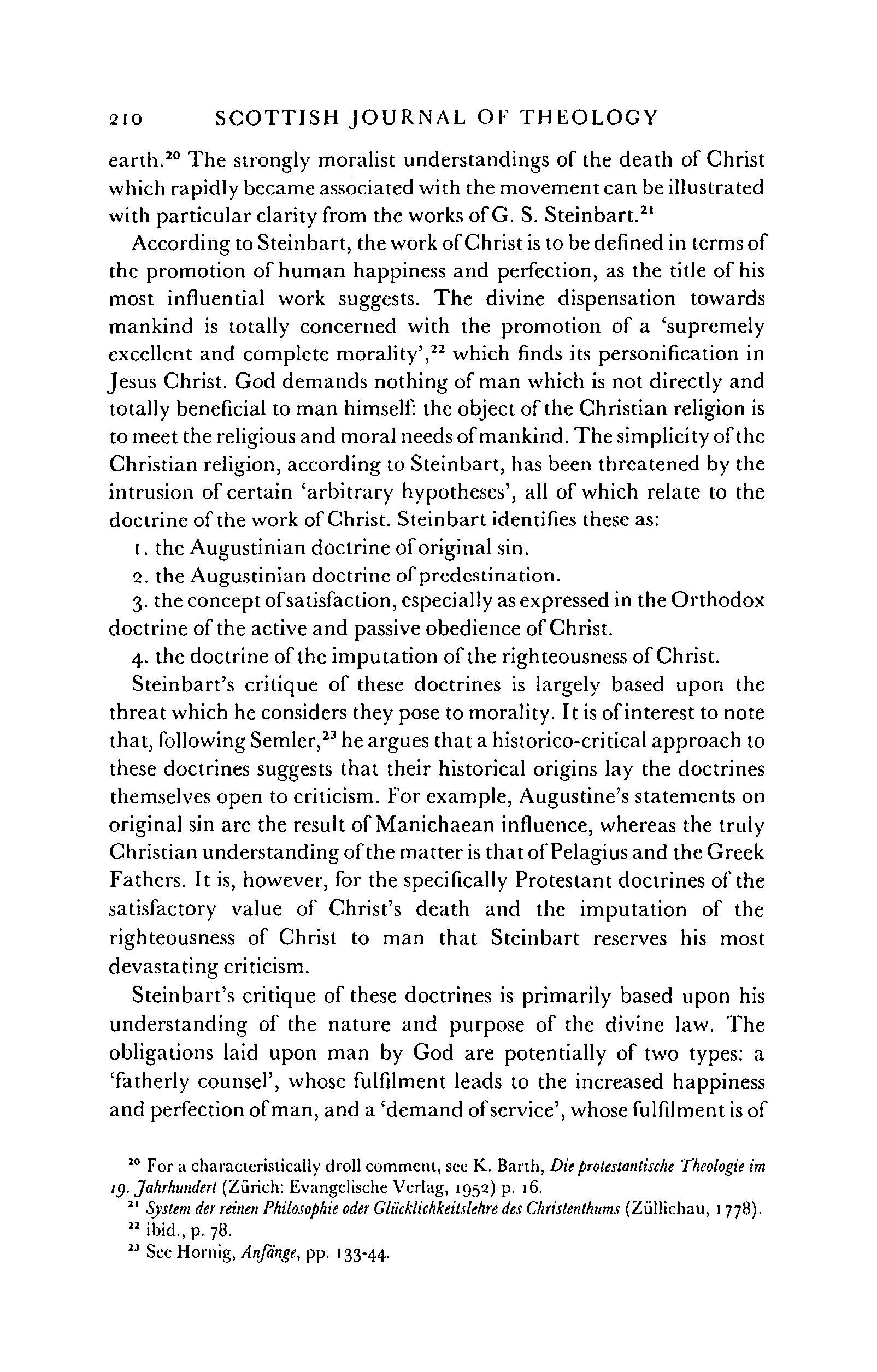
SCOTTISH JOURNAL OF THEOLOGY
earth.20 The strongly moralist understandings of the death of Christ which rapidly became associated with the movement can be illustrated with particular clarity from the works of G. S. Steinbart.21
According to Steinbart, the work of Christ is to be defined in terms of the promotion of human happiness and perfection, as the title of his most influential work suggests. The divine dispensation towards mankind is totally concerned with the promotion of a 'supremely excellent and complete morality',22 which finds its personification in Jesus Christ. God demands nothing of man which is not directly and totally beneficial to man himself: the object of the Christian religion is to meet the religious and moral needs of mankind The simplicity of the Christian religion, according to Steinbart, has been threatened by the intrusion of certain 'arbitrary hypotheses', all of which relate to the doctrine of the work of Christ. Steinbart identifies these as:
1. the Augustinian doctrine of original sin.
2. the Augustinian doctrine of predestination.
3. the concept ofsatisfaction, especially as expressed in the Orthodox doctrine of the active and passive obedience of Christ
4. the doctrine of the imputation of the righteousness of Christ.
Steinbart's critique of these doctrines is largely based upon the threat which he considers they pose to morality. It is of interest to note that, following Semler,23 he argues that a historico-critical approach to these doctrines suggests that their historical origins lay the doctrines themselves open to criticism. For example, Augustine's statements on original sin are the result of Manichaean influence, whereas the truly Christian understanding of the matter is that of Pelagius and the Greek Fathers. It is, however, for the specifically Protestant doctrines of the satisfactory value of Christ's death and the imputation of the righteousness of Christ to man that Steinbart reserves his most devastating criticism.
Steinbart's critique of these doctrines is primarily based upon his understanding of the nature and purpose of the divine law. The obligations laid upon man by God are potentially of two types: a 'fatherly counsel', whose fulfilment leads to the increased happiness and perfection of man, and a 'demand of service', whose fulfilment is of
20 For a characteristically droll comment , sec K Barth, Die prolestantische Theologie im ig. Jahrhundert (Zurich: Evangelische Verlag, 1952) p. 16.
21 System der reinen Philosophic oder Gliicklickkeitslehre des Christenthums (Ziillichau, 1 778).
22 ibid., p. 78.
23 See Hornig, Anjange, pp. 133-44.
210
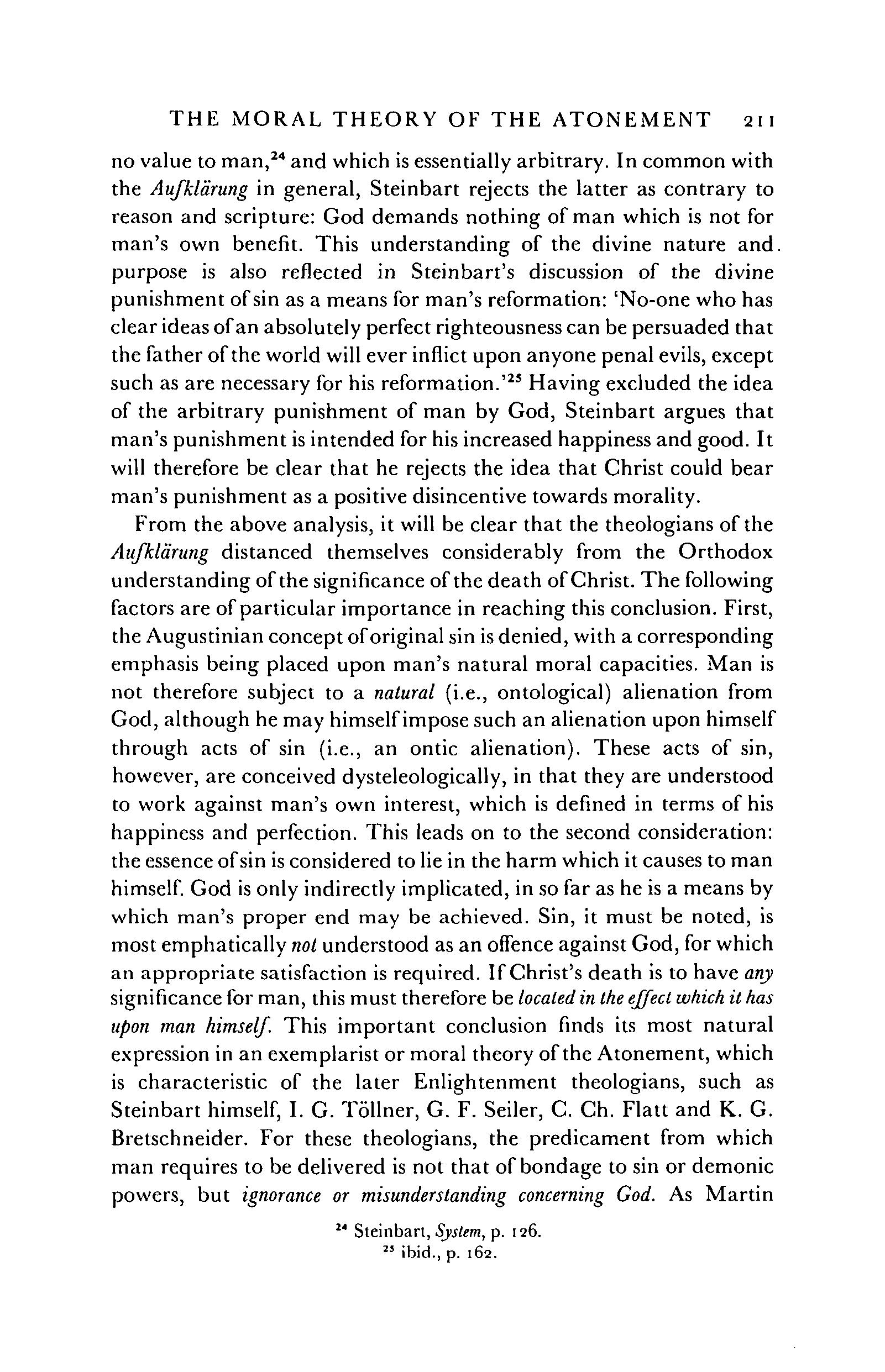
TH E MORA L THEOR Y OF TH E ATONEMEN T 211
no value to man, 24 and which is essentially arbitrary. In common with the Aufkldrung in general, Steinbart rejects the latter as contrary to reason and scripture: God demands nothing of man which is not for man's own benefit. This understanding of the divine nature and. purpose is also reflected in Steinbart's discussion of the divine punishment of sin as a means for man's reformation: 'No-one who has clear ideas of an absolutely perfect righteousness can be persuaded that the father of the world will ever inflict upon anyone penal evils, except such as are necessary for his reformation.'25 Having excluded the idea of the arbitrary punishment of man by God, Steinbart argues that man's punishment is intended for his increased happiness and good. It will therefore be clear that he rejects the idea that Christ could bear man's punishment as a positive disincentive towards morality.
From the above analysis, it will be clear that the theologians of the Aufkldrung distanced themselves considerably from the Orthodox understanding of the significance of the death of Christ. The following factors are of particular importance in reaching this conclusion First, the Augustinian concept of original sin is denied, with a corresponding emphasis being placed upon man's natural moral capacities. Man is not therefore subject to a natural (i.e., ontological) alienation from God, although he may himself impose such an alienation upon himself through acts of sin (i.e., an ontic alienation). These acts of sin, however, are conceived dysteleologically, in that they are understood to work against man's own interest, which is defined in terms of his happiness and perfection. This leads on to the second consideration: the essence of sin is considered to lie in the harm which it causes to man himself. God is only indirectly implicated, in so far as he is a means by which man's proper end may be achieved. Sin, it must be noted, is most emphatically not understood as an offence against God, for which an appropriate satisfaction is required. If Christ's death is to have any significance for man, this must therefore be located in the effect which it has upon man himself. This important conclusion finds its most natural expression in an exemplarist or moral theory of the Atonement, which is characteristic of the later Enlightenment theologians, such as Steinbart himself, I G Tollner, G F Seiler, C Ch Flatt and K G Bretschneider. For these theologians, the predicament from which man requires to be delivered is not that of bondage to sin or demonic powers, but ignorance or misunderstanding concerning God. As Martin
24 Steinbart, System, p 126
25 ibid., p 162
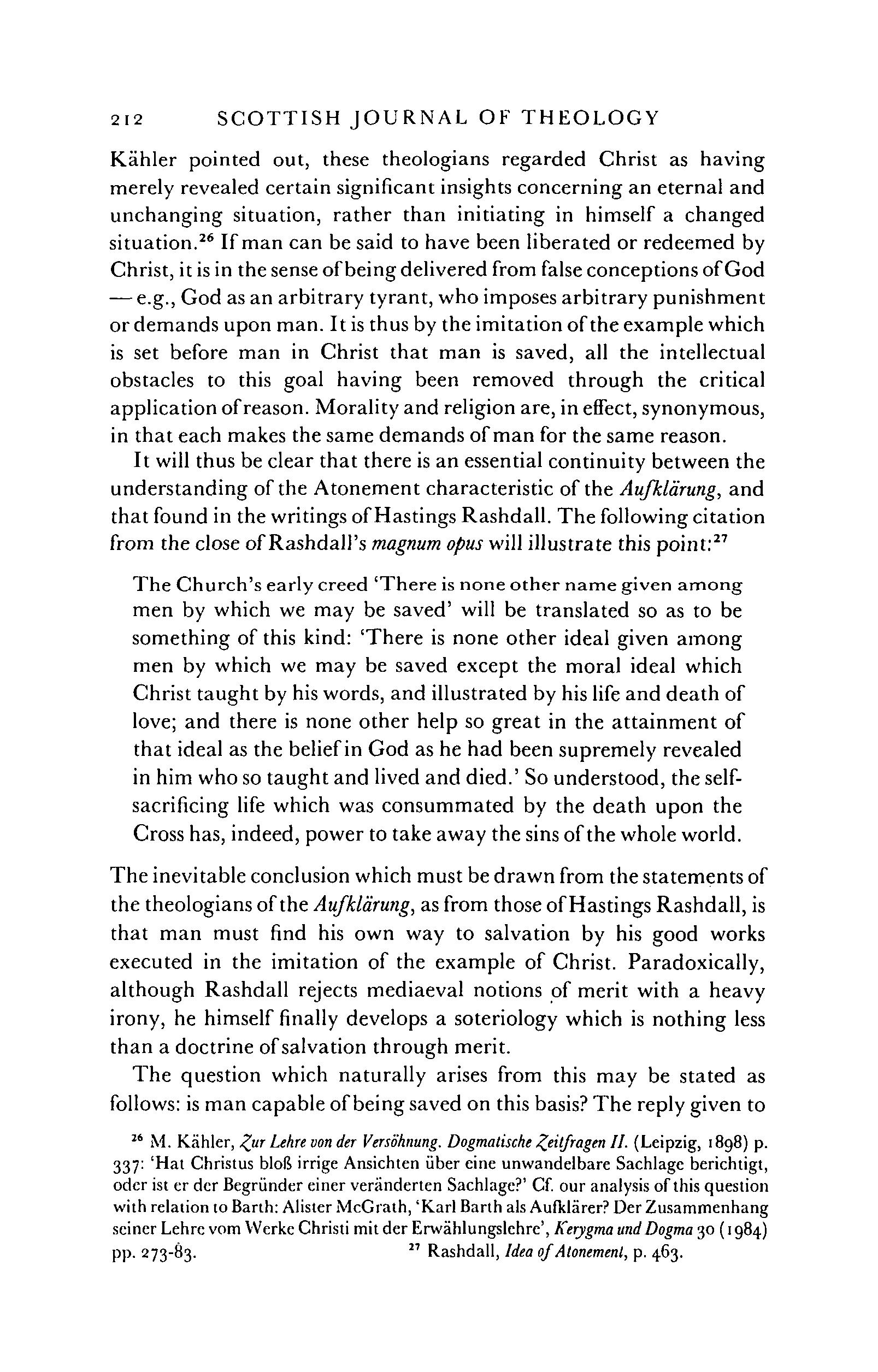
JOURNAL OF THEOLOGY
Kahler pointed out, these theologians regarded Christ as having merely revealed certain significant insights concerning an eternal and unchanging situation, rather than initiating in himself a changed situation.26 If man can be said to have been liberated or redeemed by Christ, it is in the sense of being delivered from false conceptions of God e.g., God as an arbitrary tyrant, who imposes arbitrary punishment or demands upon man. It is thus by the imitation of the example which is set before man in Christ that man is saved, all the intellectual obstacles to this goal having been removed through the critical application of reason. Morality and religion are, in effect, synonymous, in that each makes the same demands of man for the same reason.
It will thus be clear that there is an essential continuity between the understanding of the Atonement characteristic of the Aufkldrung, and that found in the writings of Hastings Rashdall. The following citation from the close of RashdalPs magnum opus will illustrate this point:27
The Church's early creed 'There is none other name given among men by which we may be saved' will be translated so as to be something of this kind: 'There is none other ideal given among men by which we may be saved except the moral ideal which Christ taught by his words, and illustrated by his life and death of love; and there is none other help so great in the attainment of that ideal as the belief in God as he had been supremely revealed in him who so taught and lived and died.' So understood, the selfsacrificing life which was consummated by the death upon the Cross has, indeed, power to take away the sins of the whole world.
The inevitable conclusion which must be drawn from the statements of the theologians of the Aufkldrung, as from those of Hastings Rashdall, is that man must find his own way to salvation by his good works executed in the imitation of the example of Christ. Paradoxically, although Rashdall rejects mediaeval notions of merit with a heavy irony, he himself finally develops a soteriology which is nothing less than a doctrine of salvation through merit.
The question which naturally arises from this may be stated as follows: is man capable of being saved on this basis? The reply given to
26 M Kahler, %ur Lehre von der Versb'hnung. Dogmatische 2jitfragen II. (Leipzig, 1898) p 337: 'Hat Christus bloft irrige Ansichten iiber eine unwandelbare Sachlage berichtigt, oder ist er dcr Begriinder einer veranderten Sachlage?' Cf our analysis of this question with relation to Barth: Alister McGrath, 'Karl Barth als Aufklarer? Der Zusammenhang seiner Lehre vom Werkc Christi mit der Erwahlungslchre', Kerygma undDogma 30 (1984) pp 273-83 " Rashdall, Idea ofAtonement, p 463
212
SCOTTISH
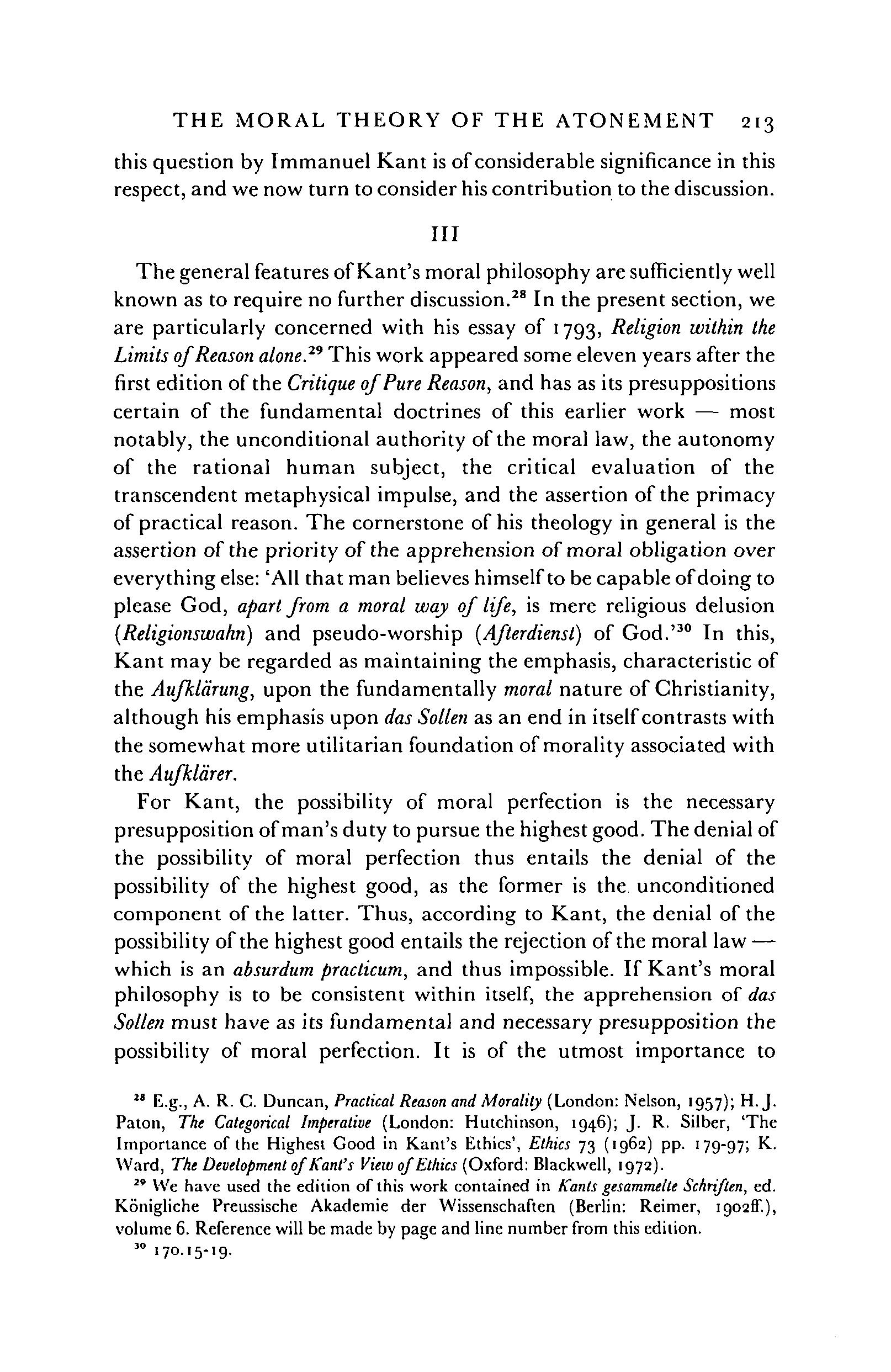
THE MORAL THEORY OF THE ATONEMENT 213
this question by Immanuel Kant is of considerable significance in this respect, and we now turn to consider his contribution to the discussion.
Ill
The general features of Kant's moral philosophy are sufficiently well known as to require no further discussion.28 In the present section, we are particularly concerned with his essay of 1793, Religion within the Limits ofReason alone.29 This work appeared some eleven years after the first edition of the Critique of Pure Reason, and has as its presuppositions certain of the fundamental doctrines of this earlier work — most notably, the unconditional authority of the moral law, the autonomy of the rational human subject, the critical evaluation of the transcendent metaphysical impulse, and the assertion of the primacy of practical reason. The cornerstone of his theology in general is the assertion of the priority of the apprehension of moral obligation over everything else: 'All that man believes himself to be capable of doing to please God, apart from a moral way of life, is mere religious delusion (Religionswakn) and pseudo-worship {Afterdiensl) of God.'30 In this, Kant may be regarded as maintaining the emphasis, characteristic of the Aufhldrung, upon the fundamentally moral nature of Christianity, although his emphasis upon das Sollen as an end in itself contrasts with the somewhat more utilitarian foundation of morality associated with the Aufkldrer.
For Kant, the possibility of moral perfection is the necessary presupposition of man's duty to pursue the highest good. The denial of the possibility of moral perfection thus entails the denial of the possibility of the highest good, as the former is the unconditioned component of the latter. Thus, according to Kant, the denial of the possibility of the highest good entails the rejection of the moral law — which is an absurdum praclicum, and thus impossible. If Kant's moral philosophy is to be consistent within itself, the apprehension of das Sollen must have as its fundamental and necessary presupposition the possibility of moral perfection. It is of the utmost importance to
" E.g., A. R. C. Duncan, Practical Reason and Morality (London: Nelson, 1957); H. J. Paton, The Categorical Imperative (London: Hutchinson, 1946); J. R. Silber, 'The Importance of the Highest Good in Kant's Ethics', Ethics 73 (1962) pp. 179-97; K. Ward, The Development of Kant's View ofEthics (Oxford: Blackwell, 1972)
29 W e have used the edition of this wor k containe d in Kants gesammelte Schriften, ed. Konigliche Preussische Akademie der Wissenschaften (Berlin: Reimer, igo2ff.), volume 6 Reference will be made by page and line number from this edition
3 0 170.15- 1 g .
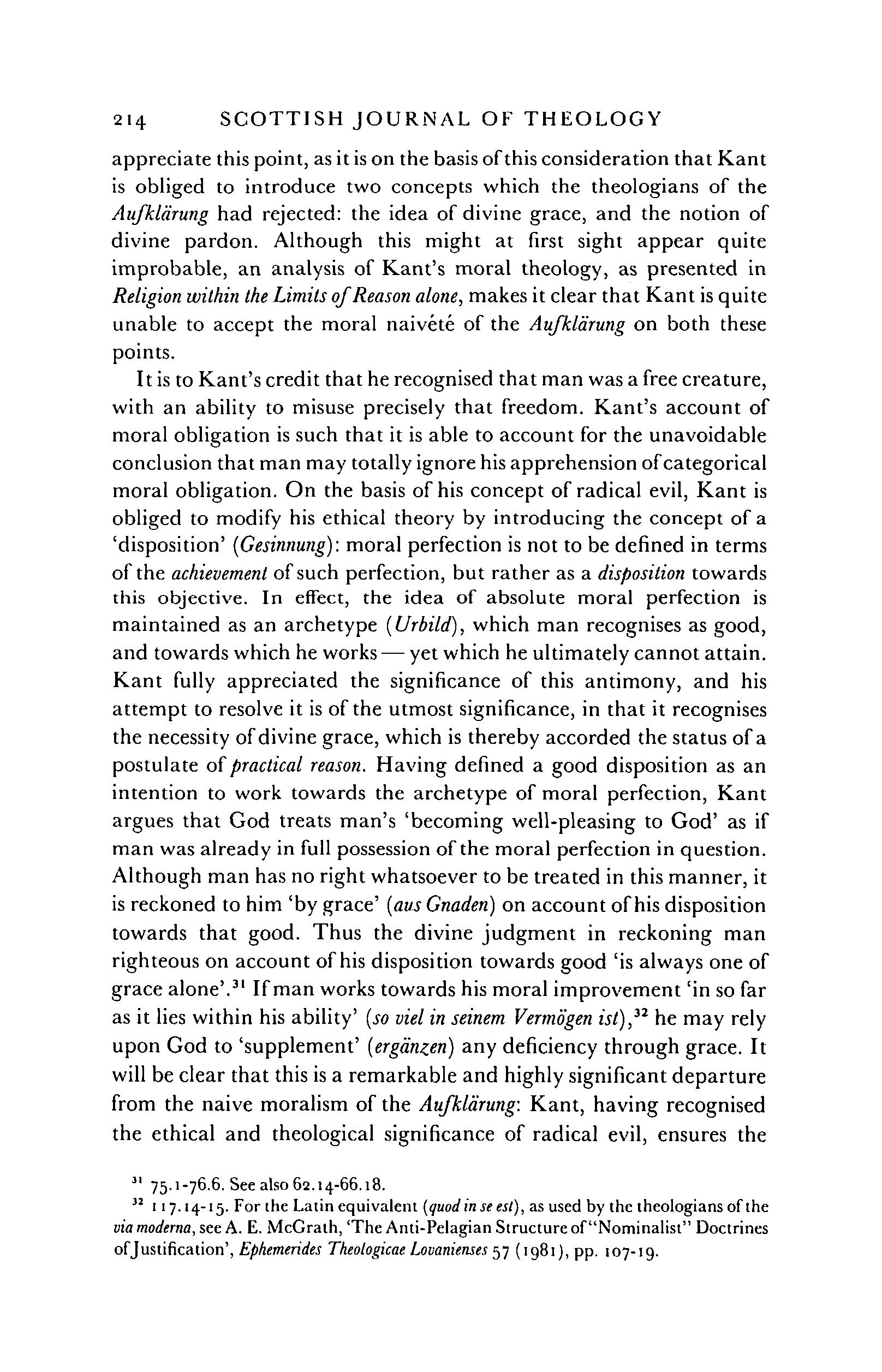
SCOTTISH JOURNAL OF THEOLOGY
appreciate this point, as it is on the basis of this consideration that Kant is obliged to introduce two concepts which the theologians of the Aufkldrung had rejected: the idea of divine grace, and the notion of divine pardon. Although this might at first sight appear quite improbable, an analysis of Kant's moral theology, as presented in Religion within the Limits ofReason alone, makes it clear that Kant is quite unable to accept the moral naivete of the Aufkldrung on both these points.
It is to Kant's credit that he recognised that man was a free creature, with an ability to misuse precisely that freedom. Kant's account of moral obligation is such that it is able to account for the unavoidable conclusion that man may totally ignore his apprehension of categorical moral obligation. On the basis of his concept of radical evil, Kant is obliged to modify his ethical theory by introducing the concept of a 'disposition' (Gesinnung): moral perfection is not to be defined in terms of the achievement of such perfection, but rather as a disposition towards this objective In effect, the idea of absolute moral perfection is maintained as an archetype (Urbild), which man recognises as good, and towards which he works — yet which he ultimately cannot attain Kant fully appreciated the significance of this antimony, and his attempt to resolve it is of the utmost significance, in that it recognises the necessity of divine grace, which is thereby accorded the status of a postulate of practical reason. Having defined a good disposition as an intention to work towards the archetype of moral perfection, Kant argues that God treats man's 'becoming well-pleasing to God' as if man was already in full possession of the moral perfection in question. Although man has no right whatsoever to be treated in this manner, it is reckoned to him 'by grace' (aus Gnaden) on account of his disposition towards that good. Thus the divine judgment in reckoning man righteous on account of his disposition towards good 'is always one of grace alone'.31 If man works towards his moral improvement 'in so far as it lies within his ability' (so viel in seinem Vermogen ist),32 he may rely upon God to 'supplement' (ergdnzen) any deficiency through grace. It will be clear that this is a remarkable and highly significant departure from the naive moralism of the Aufkldrung: Kant, having recognised the ethical and theological significance of radical evil, ensures the
31 75.1-76.6 See also 62.14-66.18
32 117.14-15. For the Latin equivalent (quod in se est), as used by the theologians of the viamoderna,seeA. E. McGrath, 'The Anti-Pelagian Structure of "Nominalist" Doctrines ofJustification', Ephemerides Theologicae Lovanienses 57 (1981), pp 107-19
214
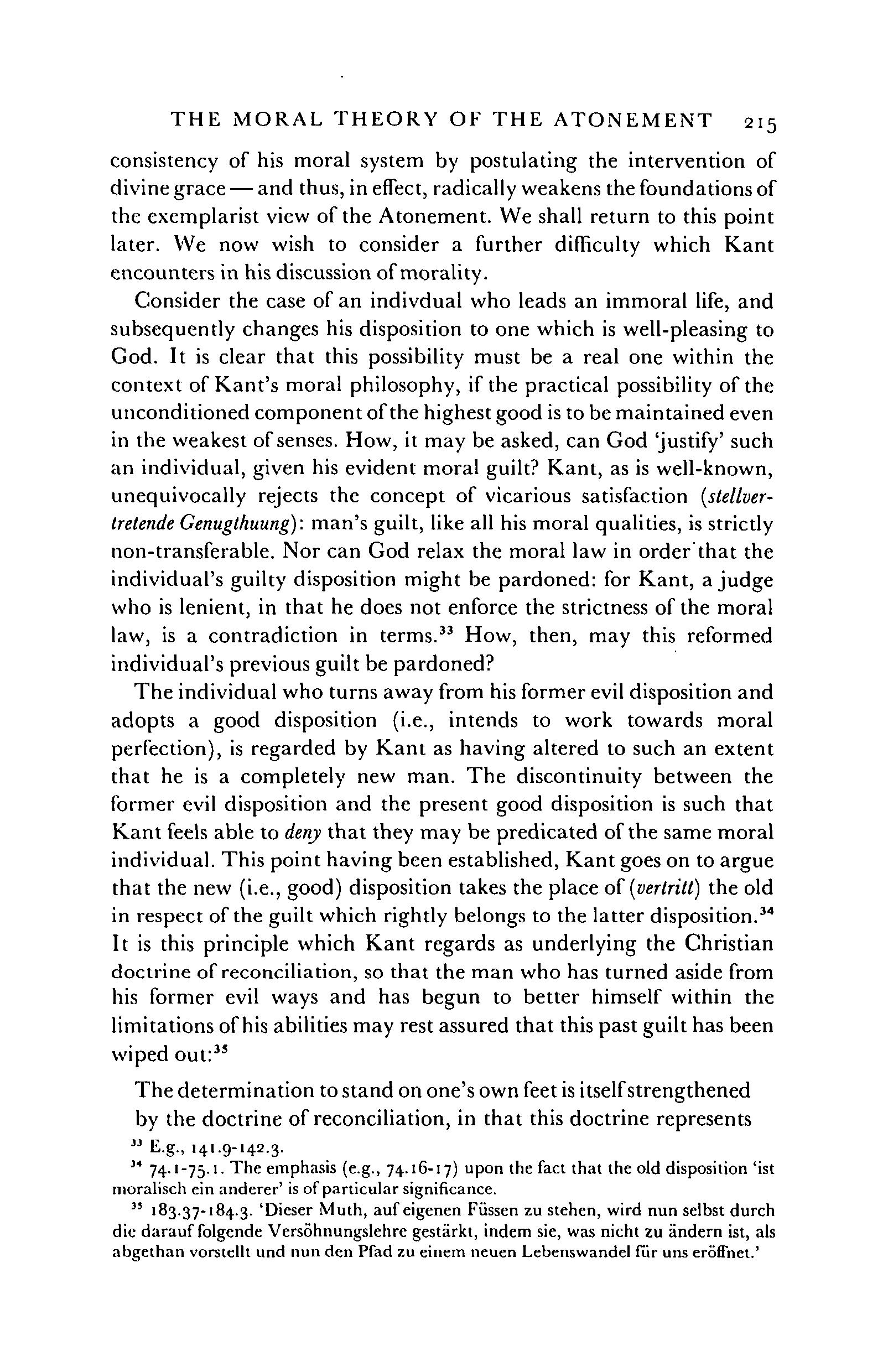
THE MORAL THEORY OF THE ATONEMENT 215
consistency of his moral system by postulating the intervention of divine grace — and thus, in effect, radically weakens the foundations of the exemplarist view of the Atonement. We shall return to this point later. We now wish to consider a further difficulty which Kant encounters in his discussion of morality.
Consider the case of an indivdual who leads an immoral life, and subsequently changes his disposition to one which is well-pleasing to God. It is clear that this possibility must be a real one within the context of Kant's moral philosophy, if the practical possibility of the unconditioned component of the highest good is to be maintained even in the weakest of senses. How, it may be asked, can God 'justify' such an individual, given his evident moral guilt? Kant, as is well-known, unequivocally rejects the concept of vicarious satisfaction (stellvertretende Genuglhuung): man's guilt, like all his moral qualities, is strictly non-transferable Nor can God relax the moral law in order that the individual's guilty disposition might be pardoned: for Kant, a judge who is lenient, in that he does not enforce the strictness of the moral law, is a contradiction in terms.33 How, then, may this reformed individual's previous guilt be pardoned?
The individual who turns away from his former evil disposition and adopts a good disposition (i.e., intends to work towards moral perfection), is regarded by Kant as having altered to such an extent that he is a completely new man. The discontinuity between the former evil disposition and the present good disposition is such that Kant feels able to deny that they may be predicated of the same moral individual This point having been established, Kant goes on to argue that the new (i.e., good) disposition takes the place of (verlritt) the old in respect of the guilt which rightly belongs to the latter disposition.34 It is this principle which Kant regards as underlying the Christian doctrine of reconciliation, so that the man who has turned aside from his former evil ways and has begun to better himself within the limitations of his abilities may rest assured that this past guilt has been wiped out:35
The determination to stand on one's own feet is itself strengthened by the doctrine of reconciliation, in that this doctrine represents " E.g., 141.9-142.3.
34 74.1-75.1. The emphasis (e.g., 74.16-17) upon the fact that the old disposition 'ist moralisch ein anderer' is of particular significance
35 '83.37-184.3 'Dieser Muth, auf eigenen Fiissen zu stehen, wird nun selbst durch die darauf folgende Versohnungslehre gestarkt, indem sie, was nicht zu andern ist, als abgethan vorstellt und nun den Pfad zu einem neuen Lebenswandel fur uns eroffhet.'
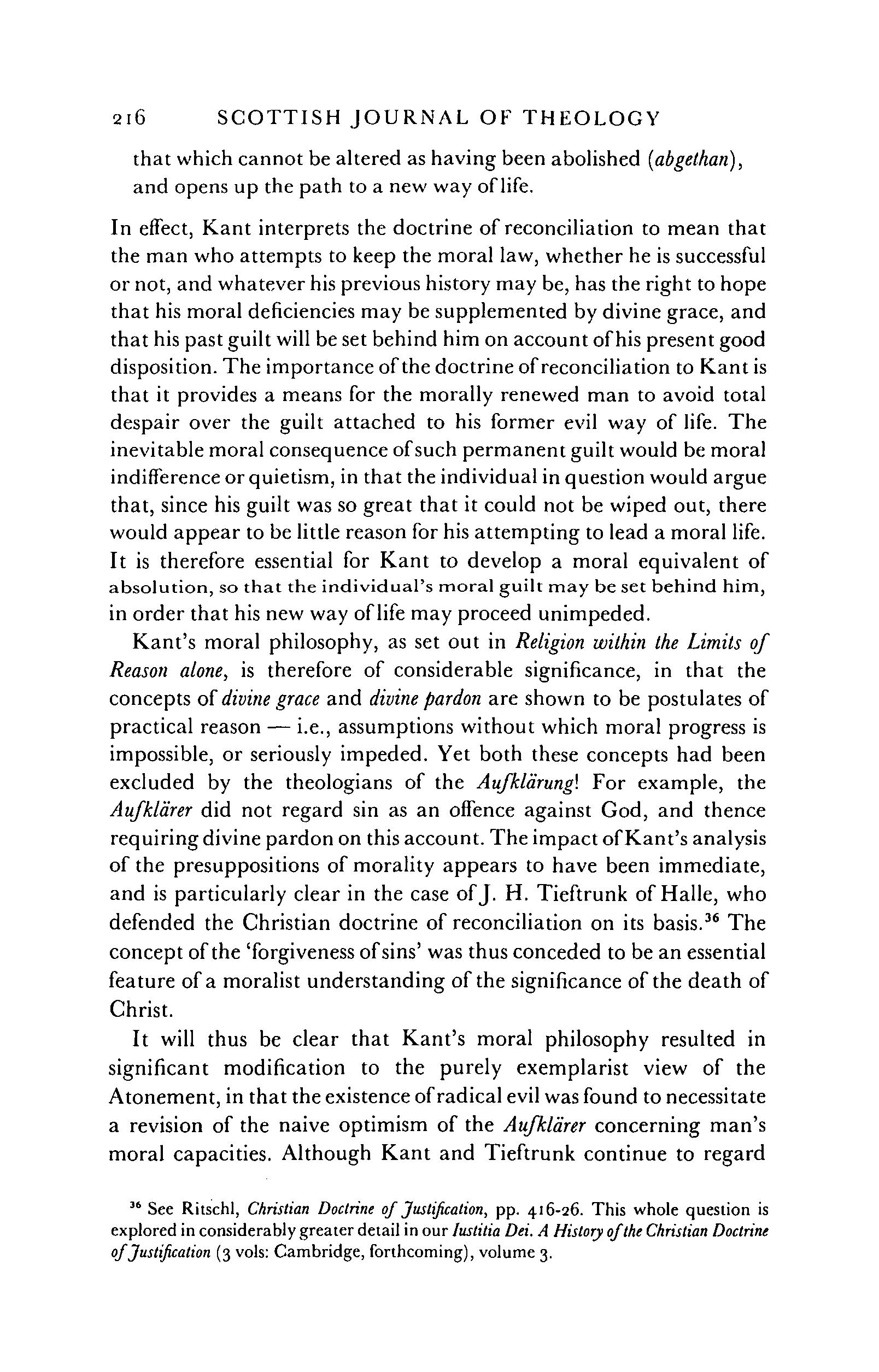
SCOTTISH JOURNAL OF THEOLOGY
that which cannot be altered as having been abolished (abgethan), and opens up the path to a new way of life.
In effect, Kant interprets the doctrine of reconciliation to mean that the man who attempts to keep the moral law, whether he is successful or not, and whatever his previous history may be, has the right to hope that his moral deficiencies may be supplemented by divine grace, and that his past guilt will be set behind him on account of his present good disposition. The importance of the doctrine of reconciliation to Kant is that it provides a means for the morally renewed man to avoid total despair over the guilt attached to his former evil way of life The inevitable moral consequence of such permanent guilt would be moral indifference or quietism, in that the individual in question would argue that, since his guilt was so great that it could not be wiped out, there would appear to be little reason for his attempting to lead a moral life It is therefore essential for Kant to develop a moral equivalent of absolution, so that the individual's moral guilt may be set behind him, in order that his new way of life may proceed unimpeded.
Kant's moral philosophy, as set out in Religion within the Limits of Reason alone, is therefore of considerable significance, in that the concepts of divine grace and divine pardon are shown to be postulates of practical reason — i.e., assumptions without which moral progress is impossible, or seriously impeded. Yet both these concepts had been excluded by the theologians of the Aufkldrung\ For example, the Aufkldrer did not regard sin as an offence against God, and thence requiring divine pardon on this account. The impact of Kant's analysis of the presuppositions of morality appears to have been immediate, and is particularly clear in the case of J. H. Tieftrunk of Halle, who defended the Christian doctrine of reconciliation on its basis.36 The concept of the 'forgiveness of sins' was thus conceded to be an essential feature of a moralist understanding of the significance of the death of Christ.
It will thus be clear that Kant's moral philosophy resulted in significant modification to the purely exemplarist view of the Atonement, in that the existence of radical evil was found to necessitate a revision of the naive optimism of the Aufkldrer concerning man's moral capacities. Although Kant and Tieftrunk continue to regard
36 See Ritschl, Christian Doctrine of Justification, pp 416-26 This whole question is explored in considerably greater detail in our lustitia Dei. A History ofthe Christian Doctrine ofJustification (3 vols: Cambridge, forthcoming), volume 3.
216
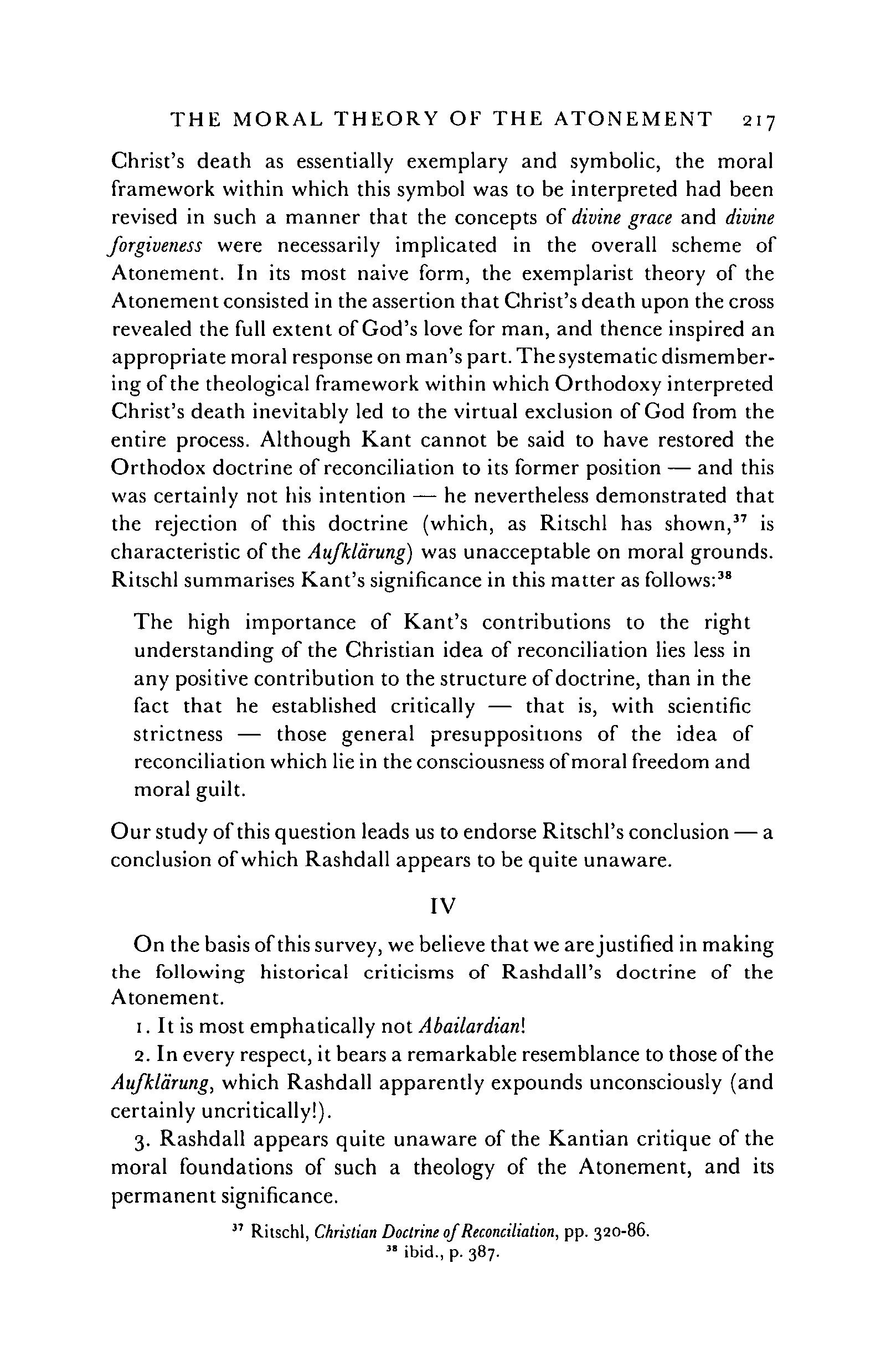
THE MORAL THEORY OF THE ATONEMENT 217
Christ's death as essentially exemplary and symbolic, the moral framework within which this symbol was to be interpreted had been revised in such a manner that the concepts of divine grace and divine forgiveness were necessarily implicated in the overall scheme of Atonement. In its most naive form, the exemplarist theory of the Atonement consisted in the assertion that Christ's death upon the cross revealed the full extent of God's love for man, and thence inspired an appropriate moral response on man's part. The systematic dismembering of the theological framework within which Orthodoxy interpreted Christ's death inevitably led to the virtual exclusion of God from the entire process. Although Kant cannot be said to have restored the Orthodox doctrine of reconciliation to its former position — and this was certainly not his intention — he nevertheless demonstrated that the rejection of this doctrine (which, as Ritschl has shown,37 is characteristic of the Aufkldrung) was unacceptable on moral grounds. Ritschl summarises Kant's significance in this matter as follows:38
The high importance of Kant's contributions to the right understanding of the Christian idea of reconciliation lies less in any positive contribution to the structure of doctrine, than in the fact that he established critically — that is, with scientific strictness — those general presuppositions of the idea of reconciliation which lie in the consciousness of moral freedom and moral guilt.
Our study of this question leads us to endorse Ritschl's conclusion — a conclusion of which Rashdall appears to be quite unaware
IV
On the basis of this survey, we believe that we arejustified in making the following historical criticisms of Rashdall's doctrine of the Atonement
1. It is most emphatically not Abailardian\
2. In every respect, it bears a remarkable resemblance to those of the Aufkldrung, which Rashdall apparently expounds unconsciously (and certainly uncritically!).
3. Rashdall appears quite unaware of the Kantian critique of the moral foundations of such a theology of the Atonement, and its permanent significance.
37 Ritschl, Christian Doctrine of Reconciliation, pp 320-86 31 ibid., p. 387.
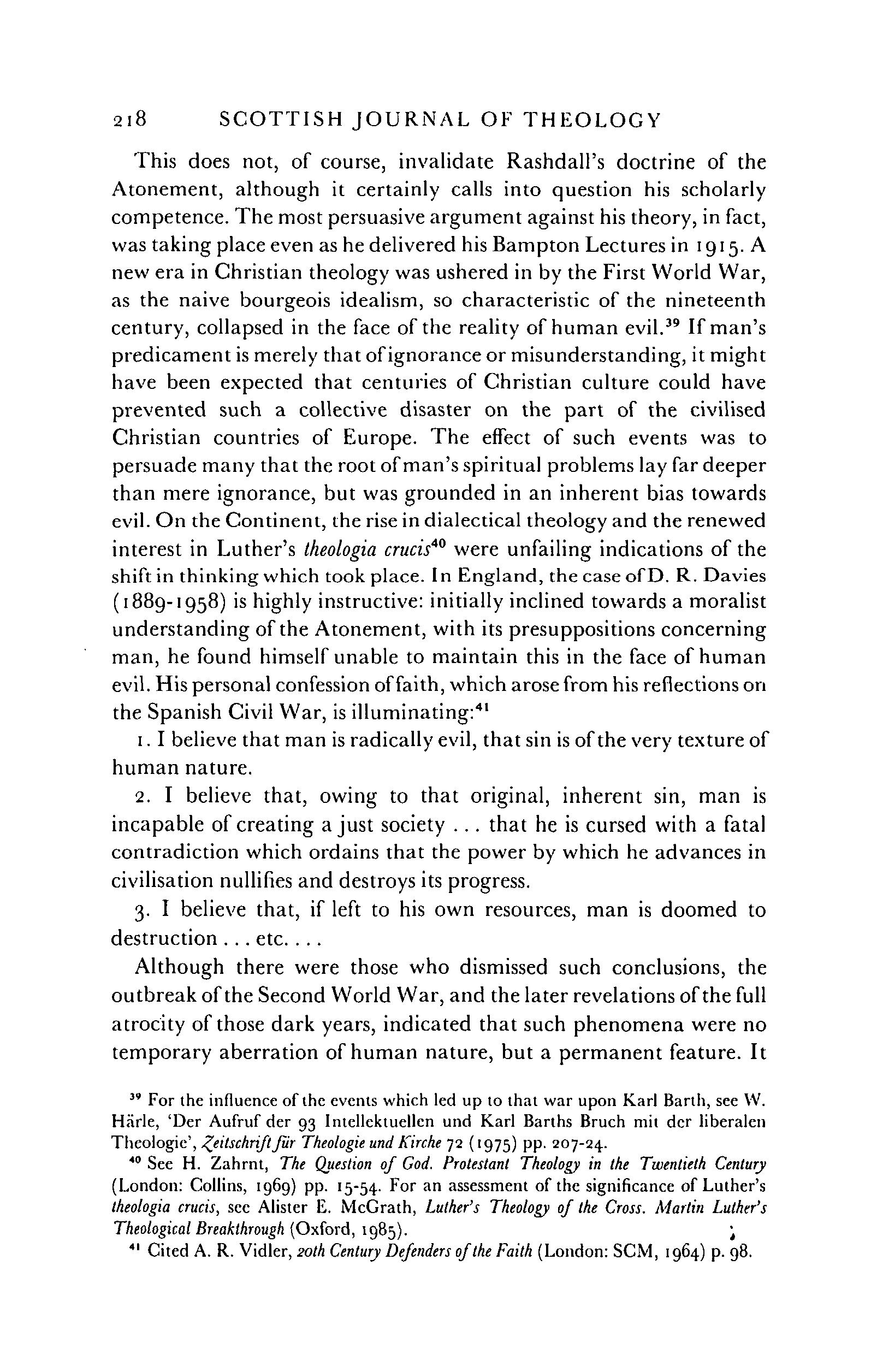
SCOTTISH JOURNAL OF THEOLOGY
This does not, of course, invalidate Rashdall's doctrine of the Atonement, although it certainly calls into question his scholarly competence. The most persuasive argument against his theory, in fact, was taking place even as he delivered hisBampton Lectures in 1915. A new era in Christian theology was ushered in by the First World War, as the naive bourgeois idealism, so characteristic of the nineteenth century, collapsed in the face of the reality of human evil.39 If man's predicament is merely that of ignorance or misunderstanding, it might have been expected that centuries of Christian culture could have prevented such a collective disaster on the part of the civilised Christian countries of Europe. The effect of such events was to persuade many that the root of man's spiritual problems lay far deeper than mere ignorance, but was grounded in an inherent bias towards evil On the Continent, the rise in dialectical theology and the renewed interest in Luther's theologia crucis*0 were unfailing indications of the shift in thinking which took place. In England, the case of D. R. Davies (1889-1958) is highly instructive: initially inclined towards a moralist understanding of the Atonement, with its presuppositions concerning man, he found himself unable to maintain this in the face of human evil. His personal confession offaith, which arose from his reflections on the Spanish Civil War, is illuminating:41
1. I believe that man is radically evil, that sin is of the very texture of human nature.
2 I believe that, owing to that original, inherent sin, man is incapable of creating a just society ... that he is cursed with a fatal contradiction which ordains that the power by which he advances in civilisation nullifies and destroys its progress.
3. I believe that, if left to his own resources, man is doomed to destruction ... etc....
Although there were those who dismissed such conclusions, the outbreak of the Second World War, and the later revelations of the full atrocity of those dark years, indicated that such phenomena were no temporary aberration of human nature, but a permanent feature. It
39 For the influence of ihe events which led up to that war upon Karl Barth, see VV Harle, 'Der Aufruf der 93 Intellektuellcn und Karl Barths Bruch mil dcr liberalen Theologie', ^eitschriftfur Theologie und Kirche 72 (1975) pp 207-24
40 See H Zahrnt , The Question of God. Protestant Theology in the Twentieth Century (London: Collins, 1969) pp 15-54 F° r a n assessment of the significance of Luther's theologia crucis, see Alister E. McGrath, Luther's Theology of the Cross. Martin Luther's Theological Breakthrough (Oxford, 1985) ;
41 Cited A R Vidler, 20th Century Defenders ofthe Faith (London: SCM, 1964) p 98
218
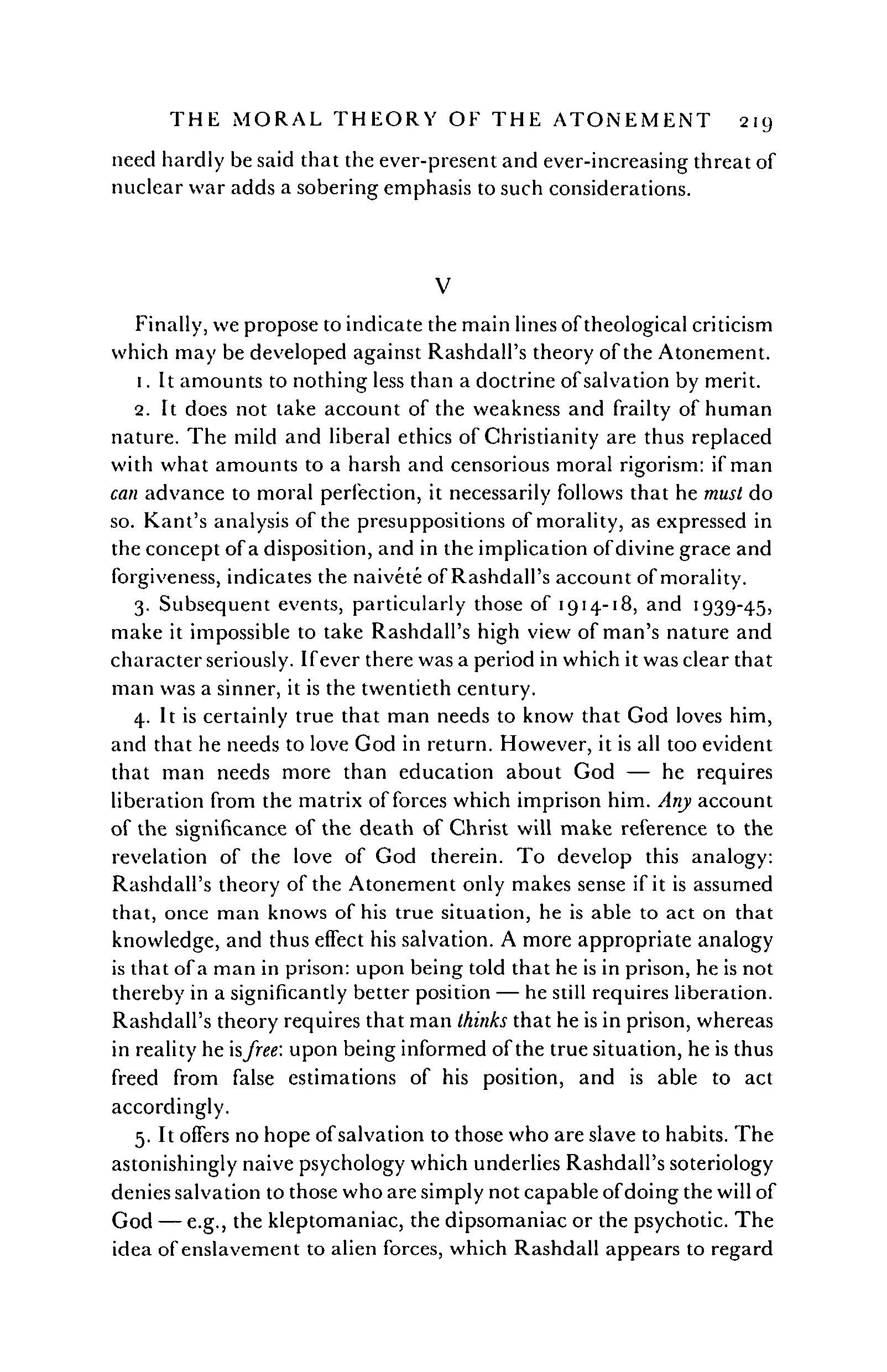
THE MORAL THEORY OF THE ATONEMENT 219
need hardly be said that the ever-present and ever-increasing threat of nuclear war adds a sobering emphasis to such considerations.
VFinally, we propose to indicate the main lines of theological criticism which may be developed against RashdalPs theory of the Atonement.
1. It amounts to nothing less than a doctrine of salvation by merit.
2. It does not take account of the weakness and frailty of human nature. The mild and liberal ethics of Christianity are thus replaced with what amounts to a harsh and censorious moral rigorism: if man can advance to moral perfection, it necessarily follows that he must do so Kant's analysis of the presuppositions of morality, as expressed in the concept of a disposition, and in the implication of divine grace and forgiveness, indicates the naivete of Rashdall's account of morality
3. Subsequent events, particularly those of 1914-18, and 1939-45, make it impossible to take Rashdall's high view of man's nature and character seriously. If ever there was a period in which it was clear that man was a sinner, it is the twentieth century
4. It is certainly true that man needs to know that God loves him, and that he needs to love God in return. However, it is all too evident that man needs more than education about God — he requires liberation from the matrix of forces which imprison him. Any account of the significance of the death of Christ will make reference to the revelation of the love of God therein. To develop this analogy: Rashdall's theory of the Atonement only makes sense if it is assumed that, once man knows of his true situation, he is able to act on that knowledge, and thus effect his salvation. A more appropriate analogy is that of a man in prison: upon being told that he is in prison, he is not thereby in a significantly better position — he still requires liberation. Rashdall's theory requires that man thinks that he is in prison, whereas in reality he isfree: upon being informed of the true situation, he is thus freed from false estimations of his position, and is able to act accordingly.
5 It offers no hope of salvation to those who are slave to habits The astonishingly naive psychology which underlies Rashdall's soteriology denies salvation to those who are simply not capable ofdoing the will of God — e.g., the kleptomaniac, the dipsomaniac or the psychotic. The idea of enslavement to alien forces, which Rashdall appears to regard
